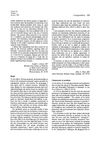 January 2015 in “Endocrine updates”
January 2015 in “Endocrine updates” Bariatric surgery patients need careful before and after surgery care for safety and long-term health.
 January 2015 in “Springer eBooks”
January 2015 in “Springer eBooks” Hormones affect skin aging, and treatments targeting hormonal balance may improve skin health.
 December 2014 in “Research and Reviews: Journal of Pharmacology and Toxicological Studies”
December 2014 in “Research and Reviews: Journal of Pharmacology and Toxicological Studies” Cabbage extract in hair gel may promote hair growth and could help treat hair loss.
 September 2014 in “Springer eBooks”
September 2014 in “Springer eBooks” Men and women experience skin aging differently due to changes in sex hormone levels with age.
 May 2014 in “Journal of Investigative Dermatology”
May 2014 in “Journal of Investigative Dermatology” Scientists developed tools to observe hair regeneration in real time and assess skin health, using glowing mice and light-controlled genes.
 March 2014 in “Journal of The American Academy of Dermatology”
March 2014 in “Journal of The American Academy of Dermatology” The document lists various dermatology topics, treatments, and diagnostic methods.
 September 2013 in “Experimental Dermatology”
September 2013 in “Experimental Dermatology” The document concluded that stem cells are crucial for skin repair, regeneration, and may help in developing advanced skin substitutes.

Hair follicles can be used to quickly assess drug effects in cancer treatment.
 September 2009 in “Pediatric Dermatology”
September 2009 in “Pediatric Dermatology” UVB is good for a skin condition in Asian kids, a lotion works for head lice, a drug helps with a skin blistering disorder, a foam reduces itchiness in skin inflammation, birthmarks can be more widespread, and criteria for a neurocutaneous disorder were agreed upon.
 January 2009 in “Springer eBooks”
January 2009 in “Springer eBooks” The document concludes that treating skin conditions should include psychological care and a multidisciplinary approach is essential for effective management.
 January 2009 in “Springer eBooks”
January 2009 in “Springer eBooks” The document concludes that managing skin conditions during pregnancy is important and requires specialized care.
 June 2008 in “Dermatologic Surgery”
June 2008 in “Dermatologic Surgery” Hydrogen peroxide may have both positive and negative effects on wound healing, and its safe concentration for hair transplant surgery is unclear.
 September 2003 in “Clinics in Family Practice”
September 2003 in “Clinics in Family Practice” Different hair diseases affect people during childbearing years, with treatments ranging from medication to psychological support.
 May 2003 in “Facial Plastic Surgery Clinics of North America”
May 2003 in “Facial Plastic Surgery Clinics of North America” Hair loss can be treated with medications like minoxidil and finasteride or surgery, but treatment effectiveness varies by alopecia type and accurate diagnosis is important.
 January 2000 in “Expert Opinion on Therapeutic Patents”
January 2000 in “Expert Opinion on Therapeutic Patents” The document highlights various patents for new compounds with potential treatments for multiple diseases, including cancer, hormonal disorders, and diabetes.
 June 1996 in “Irish Journal of Medical Science (1971 -)”
June 1996 in “Irish Journal of Medical Science (1971 -)” The document summarizes medical findings on topics like heart rhythm treatment, sleep apnea therapy, and various health conditions and treatments.
 May 1993 in “Current problems in dermatology”
May 1993 in “Current problems in dermatology” Skin symptoms are important for diagnosing infections in children.
 May 1991 in “Current problems in dermatology”
May 1991 in “Current problems in dermatology” Skin issues can indicate immune system problems.
 January 1989 in “Side effects of drugs annual”
January 1989 in “Side effects of drugs annual” Some cancer and immune system drugs can cause serious side effects, including heart, lung, nerve, and organ damage, which need careful monitoring and management.
 January 1989 in “Journal of The American Academy of Dermatology”
January 1989 in “Journal of The American Academy of Dermatology” Psoriasis patients have immune cells that respond more strongly to signals and stimuli due to an intrinsic cellular defect.
 January 1987 in “Side effects of drugs annual”
January 1987 in “Side effects of drugs annual” Some cosmetics and dermatological drugs can cause allergic reactions and side effects, like skin irritation and systemic issues.
 June 2022 in “bioRxiv (Cold Spring Harbor Laboratory)”
June 2022 in “bioRxiv (Cold Spring Harbor Laboratory)” ILC1-like cells can cause alopecia areata by attacking hair follicles.
 May 2021 in “Boletín latinoamericano y del Caribe de plantas medicinales y aromáticas”
May 2021 in “Boletín latinoamericano y del Caribe de plantas medicinales y aromáticas” Microsechium helleri extract has antioxidant, anti-inflammatory, antidiabetic, and heart-protective benefits.

Antimalarial agents are effective for LPP, and intralesional steroids are effective for FFA.

Lichen planopilaris and frontal fibrosing alopecia are likely the same disease with different clinical appearances.
 January 2016 in “Springer eBooks”
January 2016 in “Springer eBooks” Alopecia Areata is an unpredictable autoimmune hair loss condition with limited and variable treatment effectiveness.
 January 2016 in “Kafkas Journal of Medical Sciences”
January 2016 in “Kafkas Journal of Medical Sciences” Turkish pregnant women commonly experienced skin issues like itching and acne, and doctors mainly used topical treatments due to safety concerns during pregnancy.
 October 2014 in “Journal of skin and stem cell”
October 2014 in “Journal of skin and stem cell” Elidel combined with tretinoin is more effective for treating alopecia areata than Elidel alone.
 November 2010 in “Clin-Alert”
November 2010 in “Clin-Alert” Monitoring for adverse effects in clinical treatments is crucial.
 November 2020 in “Acta Scientific Women's Health”
November 2020 in “Acta Scientific Women's Health” Low vitamin D levels can significantly contribute to hair loss, especially in women aged 35-45. Correcting these levels early may help prevent and treat this condition.






























